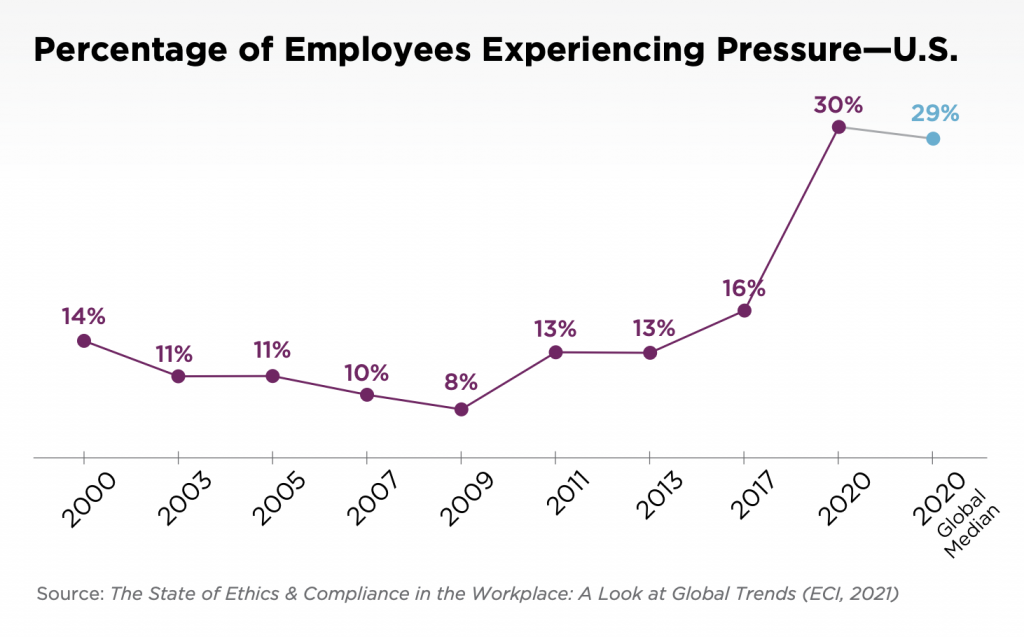Report: Ethics Pressures Mounting on Employees
A record number of U.S. workers say they feel pressure to cut ethical corners on the job, and a record number also say they have experienced retaliation after reporting corporate misconduct — and for both issues, those numbers have essentially doubled in just three years.
So says the 2021 Global Business Ethics Survey, a sweeping survey of employee perceptions of ethics in the workplace released every few years by the Ethics & Compliance Initiative. ECI released its 2021 report today, and this year’s report has several troubling findings for corporate ethics and compliance officers.
First are the statistics for U.S. employees. The good news is that 21 percent of employees say they work in organizations with a strong ethical culture, the same number who said so in ECI’s 2017 report. Even better: the number of employees who said they were likely to report misconduct they saw in the workplace rose from 69 percent in 2017 to 86 percent this year.
Now the bad news. Thirty percent of employees said they felt pressure to compromise ethical standards at work — up from 14 percent in 2017, and the highest number ever recorded for this question since ECI began conducting the survey more than 20 years ago. See Figure 1, below.

Separately, 79 percent of U.S. employees who reported misconduct said they then suffered some form of retaliation. That’s up from 44 percent in 2017 and 21 percent in 2011; and, again, is the highest number ECI has ever recorded for this question.
The situation is not much better at the global level. ECI surveys more than 14,000 employees in 10 countries around the world, and the global median for feeling pressure in 2020 was 29 percent, up from 22 percent in 2015. The number of employees feeling pressure was highest in China (53 percent), followed by India (50 percent) and Mexico (35 percent).
Ditto for employees who said they suffered retaliation for speaking up. The global median was 61 percent, up from 40 percent in 2015; and every one of the 10 countries included in the Global Business Ethics Survey experienced higher retaliation rates individually. See Figure 2, below.

So that’s some gloomy stuff. What’s really going on?
Ethics in Time of Pandemic
Obviously we need to consider all these numbers against the backdrop of global pandemic. Indeed, ECI dedicated a whole section of this year’s report to how the pandemic may have colored employees’ answers. (The survey itself was conducted in summer 2020, asking employees about their experiences “over the last 12 months.)
The key dynamic, according to ECI, is this: the more organizational change your business experiences, the worse your ethics and compliance program performs.
Well, virtually every business in the world has experienced organizational change in the last 12 months. So the pandemic’s effect on ethics and compliance programs is likely to be profound.
Figure 3, below, tells the tale. At businesses that have endured at least one organizational change in the last 12 months, employees felt more pressure to cut ethical corners; observed more misconduct; reported more misconduct; and experienced more retaliation after reporting. That was true within the United States, and across the world overall.

It shouldn’t be news for most compliance officers that corporate upheaval leads to a more complicated, less effective ethics and compliance program. The pressing question today is how to connect that fact to the specific changes your business has implemented since the pandemic began — that is, to sharpen your risk assessment capabilities, so you can anticipate how those changes will affect ethics and compliance behaviors among your employees.
For example, how has remote work changed the nature of internal reporting at your organization? Are employees reporting fewer incidents because they’re seeing fewer incidents while toiling away in their spare bedroom? Or are they reporting fewer incidents because they’re scared that speaking up might cost them their jobs? Or are they reporting more incidents because remote work chills the bonds of loyalty and friendship coworkers cultivate in the office?
Thinking about organizational upheaval is also important because compliance officers need to start thinking about business in the rest of this year.
For example, ECI warns about “what may be coming ahead” for the pandemic, and uses the 2008 financial crisis as a cautionary tale. In that instance, a wide range of businesses implemented recessionary tactics in 2009: job cuts, pay freezes, budget cuts, and so forth. Two years later, employees at those same businesses reported weaker ethical culture. That is, the recessionary tactics that might make good business sense in one year can cause profound harm on ethics and compliance for years to come.
That’s an important point to appreciate — but are we going to see a repeat of that dynamic today?
I don’t know. There’s compelling evidence to suggest that vaccinations are working, and that the Democrat’s economic relief package will deliver its own shot of macro-economic adrenaline in the second half of this year. We could have any of several economic scenarios come true by 2022, from awful to fantastic.
That’s a lot of planning and anticipating compliance officers will need to do, to assure that your compliance program remains effective by the end of this year and beyond. You’d best get started.
